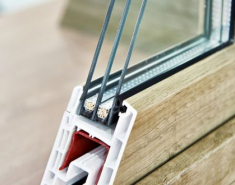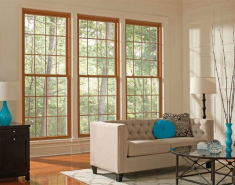Before you buy: Tips on choosing windows
Need to replace your windows? Know your stuff before you buy.
Replacing your home’s windows can enhance the curb appeal of your home, shield it from the elements, save you money in energy costs and filter noise. Here’s what you need to know before you decide what to buy.
Materials: Window frames are made from three main materials: wood; fibreglass; and vinyl, with varying quality existing in all three categories.
Wood windows are the most expensive and have the highest maintenance, requiring sealing and staining or painting every five to 10 years.
Vinyl windows are lower in price and require very little maintenance.
“If your home is really humid, you can have water running down your window and mould potentially growing. That’s going to be easier to clean up on a vinyl window than a wood window,” says Mark Wardrop, president of Ottawa Windows & Doors.
The quality of a vinyl window will vary depending on the amount of the material in the frame.
“The more vinyl in the frame, the more structurally solid that window is and the more thermal efficient it is,” says Wardrop.
Fibreglass windows also require little maintenance and are stronger than vinyl, but they carry a heftier price tag.
Problem areas: The issues you have with your existing windows will impact the type of windows you purchase. The three most common window problems are noise, energy loss and fading furniture.
Noise: If your home is on a busy street, you’ll likely want windows that reduce the amount of noise that filters into the home.
While many homeowners assume a double-pane window will do the trick, Wardrop recommends two mix-matched thicknesses of glass, rather than a regular double-pane, which consists of two pieces of glass at the same thickness. A three-millimetre pane behind a five-mm pane, for example, will allow sound frequencies to reflect on different thicknesses, reducing the amount of noise entering the home.
Energy loss: As for energy efficiency, the right windows can reduce your heating and cooling costs.
Wardrop recommends windows with a solar heat gain co-efficient around 0.55 (this number measures the amount of heat that’s coming in through the window) and a U-factor of 0.3 or lower (this number indicates the rate of heat loss through the window). Both numbers can be found on window labels.
UV rays: Harsh UV rays can cause carpet and upholstery to fade. To protect your belongings, look for windows with a “low-e” (low-emissivity) coating that minimizes the amount of ultraviolet and infrared light passing through the glass. You can purchase one, two or three layers of low-e coating.
“The more layers you have, the less UV is getting into your home,” says Wardrop, although these additional coatings also darken the glass and are detrimental to plants, which thrive on UV light.
Cost: When replacing all of the windows in your home, Wardrop recommends budgeting $1,200 per hole in the wall.
“Your basement window is going to be a lot cheaper than that and your living room window is going to be more expensive, but on average it seems to work out,” he says.
Installation: “The installation is as important as the product that you’re putting in,” says Wardrop. Choose a company that pays installers per hour rather than per piece to ensure they aren’t motivated to do the job fast, but to do it well.
Source: https://bit.ly/374R9UW









